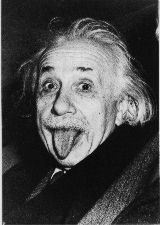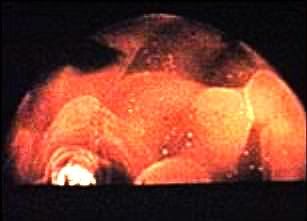
Posted on 01/01/2005 4:55:42 PM PST by neverdem
GUEST OP-ED CONTRIBUTOR
London
WE have now entered what is being celebrated as the Einstein Year, marking the centenary of the physicist's annus mirabilis in 1905, when he published three landmark papers - those that proved the existence of the atom, showed the validity of quantum physics and, of course, introduced the world to his theory of special relativity. Not bad for a beginner.
"It's not that I'm so smart," Einstein once said, "It's just that I stay with problems longer." Whatever the reason for his greatness, there is no doubt that this determination allowed him to invent courageous new physics and explore realms that nobody else had dared to investigate.
What he was not, however, was a perfect genius. In fact, when it came to the biggest scientific issue of all - the origin of the universe - he was utterly wrong. And while we should certainly laud his achievements over the next 12 months, we may learn a more valuable lesson by investigating Einstein's greatest failure.
The story starts in the late 19th century, when the scientific establishment believed in an eternal and unchanging universe. This was a neat theory of cosmology, because a universe that had always existed did not raise any awkward questions, such as "When was the universe created?" and "What (or Who) created it?"
Einstein grew up in this era, and was similarly convinced that the universe had existed for an eternity. However, when he developed general relativity (his theory of gravity) in 1915, he became aware of a tricky problem. Gravity is an attractive force - it attracts coins to the ground and it attracts comets toward the sun. So why hadn't gravity caused the matter in the universe to collapse inward on itself?
Gravity seemed to be incompatible with an eternal, unchanging universe, and Einstein certainly had no sympathy for the alternative view of a collapsing universe, stating that: "To admit such a possibility seems senseless."
Isaac Newton had run into the same problem with his own theory of gravity some 250 years earlier. He too believed in an eternal universe, yet he knew that gravity would have to cause its collapse after a finite time. His solution was to propose that God was responsible for keeping apart all the celestial objects, adjusting their positions from time to time as part of his cosmic curatorial responsibilities.
Einstein was reluctant to invoke God, so his solution was to fiddle with his theory of general relativity, adding an antigravity force alongside familiar gravity. This repulsive force would counteract gravity over cosmic distances, thereby maintaining the overall stability of the universe. There was no evidence for this antigravity force, but Einstein assumed that it had to exist in order to provide a platform for eternity.
Although everything now seemed to make sense, there were some dissenters. A small band of renegade cosmologists suggested in the 1920's that the universe was not eternal but had been created at a finite moment in the past. They claimed it had exploded and expanded from a small, hot, dense state into what we see today. In particular, they argued that it had once been compacted into a primeval super atom, which had then ruptured and exploded. This model, which has since developed into the Big Bang theory, did not require any stabilizing antigravity because it proposed a dynamic, evolving universe.
The Big Bang model was initially ridiculed by the scientific establishment. For example, one of its pioneers, Georges Lemaître, was both a cosmologist and an ordained priest, so critics cited his theology as his motivation for advancing such a crackpot theory of creation. They suspected that the model was Lemaître's way of sneaking a Creator into science. While Einstein was not biased against Lemaître's religious background, he did call the priest's physics "abominable." It was enough to banish the Big Bang model to the hinterlands of cosmology.
However, in 1929 Einstein was forced to eat humble pie. Edwin Hubble, working at Mount Wilson Observatory in Southern California, showed that all the distant galaxies in the universe were racing away from one another as though they were debris from a cosmic explosion. The Big Bang model seemed to be correct. And, while it would take several decades before the theory was accepted by the scientific establishment, Einstein, to his credit, did not fight on. "This is the most beautiful and satisfactory explanation of creation to which I have ever listened," he said, and even called his repulsive force the biggest blunder of his career.
In 1931, Einstein paid a visit to Hubble at Mount Wilson, where he renounced his own static cosmology and endorsed the expanding universe model. His support was enough for The New York Times to embrace the mavericks, running an article with the headline "Lemaître Suggests One, Single, Great Atom, Embracing All Energy, Started The Universe." Hubble's hometown newspaper in Missouri, The Springfield Daily News, preferred to focus on its local hero: "Youth Who Left Ozark Mountains to Study Stars Causes Einstein to Change His Mind."
It might seem that Einstein emerges from this story as a flawed genius, one who was not perfect. In fact, there is a twist to the tale, one that implies he was perhaps better than perfect.
If gravity pulls everything together, then the expansion of the Big Bang should be slowing, because all the receding galaxies would be attracted to one another. In 1998, however, when astronomers tried to measure this deceleration, they were astonished to find that the universe is in fact accelerating. The galaxies are apparently moving apart faster and faster as time passes.
What is the best explanation scientists can come up with? The existence of an antigravity force. Theorists call this repulsive effect "dark energy," but it is exactly the sort of force that Einstein posited to maintain the stability of the universe. Antigravity is now back in fashion some seven decades after he abandoned it. It seems that even when Einstein thought he was wrong, he turned out to be right.
And, as we celebrate the Einstein Year, let's also bear in mind the fact that he was prepared to admit that he was wrong. Perhaps humility, more than anything, is the mark of true genius.
Simon Singh is the author of "Fermat's Enigma" and the forthcoming "Big Bang: The Origins of the Universe."
BTTT! Einstein = genius.
I'm wayyyyy more humble than Einstein.....
E=mc2Very good, Albert. Now show your work.
E=ma2E=mb2E=mc2
FReepmail me if you want on or off my health and science ping list.
BTTT
His wife was a physicist, too.
YEC INTREP
Einstein started relativity, explained Brownian Motion, & the Photoelectric Effect.
E=mcWOW

What paragraph says that "Einstein discovered quantum physics"? The first sentence states the following:
WE have now entered what is being celebrated as the Einstein Year, marking the centenary of the physicist's annus mirabilis in 1905, when he published three landmark papers - those that proved the existence of the atom, showed the validity of quantum physics and, of course, introduced the world to his theory of special relativity.
IIRC, he "showed the validity of quantum physics" concerning the photoelectric effect with respect to frequency and voltage, but that's a long time away for me and general physics.
"Imagination is more important than knowledge".
I investigated the big bang theory when I was in the service serving overseas..... I had to get several penicillin shots as a result.
you're baaaaaaad
Not that I've noticed.
Has anyone asked the question : instead of the universe expanding(quintessance)perhaps we are all SHRINKING, a sort of universal black hole effect. And too, can anyone explain Einstein's term "rest mass"? Rest means AT REST, no change of state; mass means some(inertial or gravitational)change of state; thus an OXYMORON. Heisenberg's "delta momentum"(dM)is also an oxymoron : delta means rate of change, momentum means no change of state. Can anyone explain these two oxymorons?
 OK...
OK...
Shot:George - Yield:225 Kilotons - First Thermonuclear Test
Disclaimer: Opinions posted on Free Republic are those of the individual posters and do not necessarily represent the opinion of Free Republic or its management. All materials posted herein are protected by copyright law and the exemption for fair use of copyrighted works.